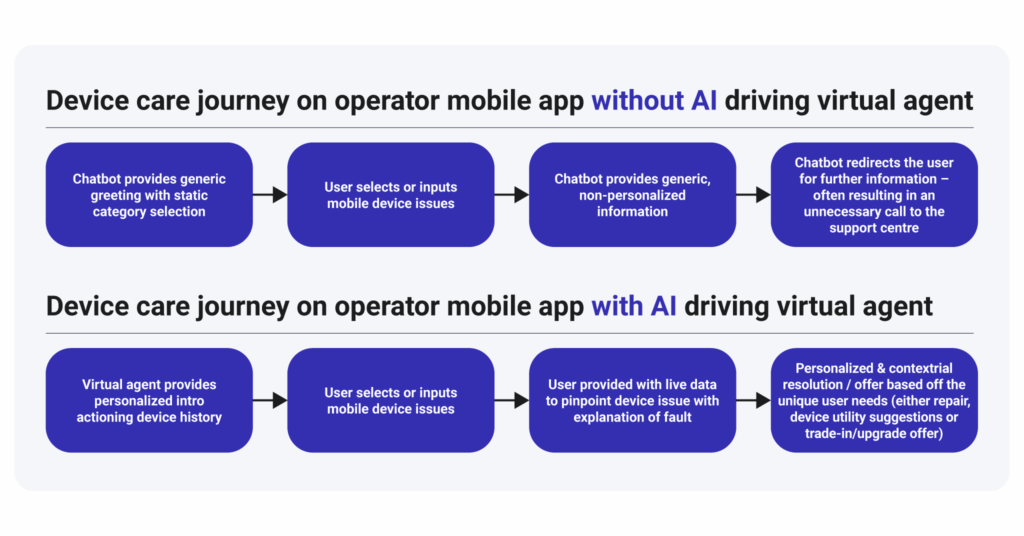Customer support has become a significant cost center for mobile operators. For three consecutive years, mobile operators experienced more than a 4 percent year-over-year increase in operational expenditures, much of it driven by repetitive, low-value support inquiries handled in retail stores and contact centers.
Device care needs aren’t going away. One in three customers need device support over a two-year period, and 64 percent of those customers end up visiting a retail location to resolve the issue. However, most would prefer to avoid the trip altogether. In fact, fewer than half want to resolve these issues in person – 59 percent of customers now prefer a digital-first, omnichannel experience, meaning they want to start on the app – and only escalate to retail or care if needed.
To respond to this demand and reduce rising support costs, most mobile operators introduced chatbots or “virtual agents” into their apps, and consumers are familiar, with 80 percent of customers having interacted with one. However, only one in three finds these agents effective. While the intent is to deflect unnecessary calls and retail visits, most virtual agents lack contextual intelligence. Most operate on rigid, rule-based scripts, without access to real-time device diagnostics or CRM data. As a result, they can’t fully understand the nature of a customer’s problem or make the right decision in response.
The result is a frustrating experience that often ends with escalation to a call center or visit to a store. When resolution expectations aren’t met, customer satisfaction drops. Net Promoter Score (NPS) falls by 19 points for phone care and 36 points when issues aren’t resolved. This drop in satisfaction is a clear signal that customers want smarter, more responsive support.
This is where Generative AI (GenAI) makes a difference. A GenAI-powered virtual agent, connected to real-time mobile device intelligence, such as diagnostic and configuration information, and CRM data, can simulate human conversation, understand customer context and offer personalized solutions. For instance, if a customer reports battery issues, the virtual agent can instantly run a diagnostic evaluation, offer steps to optimize performance or suggest an upgrade if the device is nearing the typical end-of-life period. If a repair or trade-in is more appropriate, the agent can initiate that process – guiding the customer through it in a single, on-device session and reducing the need to escalate to a call center or retail.

Deflecting even a small percentage of these inquiries from human agents can yield substantial savings. According to internal MCE data, operators leveraging digital, diagnostic self-help tools in their app, including even with AI, can deflect in opex cost savings by deflecting unnecessary calls to the support center. Furthermore, each of these deflected moments becomes a potential revenue opportunity – whether through trade-in, upsell or insurance attachment.
MCE’s dDLM platform integrates generative AI, real-time mobile device intelligence and CRM data to deliver proactive, personalized support to customers, enabling operators to deflect more unnecessary calls to the support center. Backed by over 20 years of expertise in device lifecycle management, MCE empowers mobile operators to reduce support costs, enhance customer experience and unlock new revenue opportunities – turning device care into a strategic advantage.




